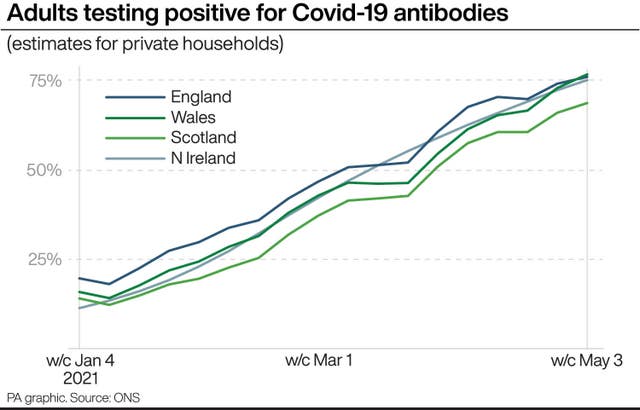Three-quarters of adults have Covid-19 antibodies, data suggests
It takes between two and three weeks after infection or vaccination for the body to make enough antibodies to fight the virus.

More than three-quarters of adults in England, Wales and Northern Ireland are estimated to have antibodies for the virus which causes Covid-19, new figures suggest.
The presence of Covid-19 antibodies implies someone has had the infection in the past or has been vaccinated.
New figures from the Office for National Statistics (ONS) suggest 75.9% of adults in England would have tested positive for antibodies in the week beginning May 3.
In Wales, an estimated 76.6% have antibodies and 75% of adults in Northern Ireland are estimated to have antibodies.
Among adults in Scotland, 68.6% were estimated to have Covid-19 antibodies in the week beginning May 3.

It takes between two and three weeks after infection or vaccination for the body to make enough antibodies to fight the virus.
Antibodies then remain in the blood at low levels, although these levels can decline over time to the point that tests can no longer detect them.
The latest estimates from the ONS are based on a sample of blood test results for the week beginning May 3.
The ONS said that in March 2021, antibody positivity decreased among people aged over 80 years. A similar decrease was seen in those in their 70s at the end of March and those in their 60s in April.
Antibody positivity has since risen and continues to rise in these older ages.
The ONS said that this is likely to reflect the increase in people receiving the second dose of a Covid-19 vaccine.
Kara Steel, senior statistician for the Covid-19 Infection Survey, said: “We are still seeing high levels of antibodies against Covid-19 across the UK which have continued to grow.
“In England, three in every four adults would now test positive for antibodies, mainly as a result of vaccination.
“We have now collected over 400,000 blood samples from our survey participants and these are invaluable to helping us understand protection against the infection within the community.”
The figures reflect the ongoing impact of the vaccine rollout across the UK, in particular the increasing number of people who have received both doses and are now fully vaccinated.
Figures from the Government show that more than 61 million vaccines have been administered across the UK, including 23 million second doses.
Once infected or vaccinated, the length of time antibodies remain at detectable levels in the blood is not fully known.
It is also not yet known how having detectable antibodies, now or at some time in the past, affects the chance of getting Covid-19 again.
The ONS estimates are for people in private households and do not include settings such as hospitals and care homes.





